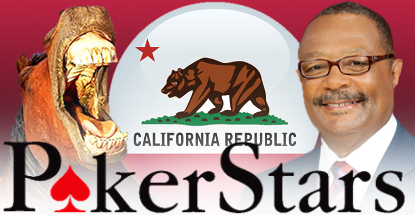A new online poker bill has arrived in California courtesy of Assemblyman Reggie Jones-Sawyer (pictured right). Titled the Internet Poker Consumer Protection Act of 2015 (read it here), the bill differs from Mike Gatto’s AB 9 legislation by allowing state racetracks to join Indian tribes and card clubs in the state’s online poker industry.
More importantly, the AB 167 bill contains no specific ‘bad actor’ clause, at least, not the boilerplate prohibition of any company that accepted wagers from state residents after Dec. 31, 2006. Instead, it deems companies/people to be ineligible if they have “contemptuously defied a legislative investigative body” of a US state, the federal government or a foreign jurisdiction “when that body is engaged in the investigation of crimes relating to poker, official corruption related to poker activities or criminal profiteering activity or organized crime.”
Ditto for anyone convicted ‘in a court of competent jurisdiction of a felony for either having accepted a bet over the internet in violation of United States of California law, or having aided or abetted that unlawful activity.”
The bill also doesn’t contain any mention of the dreaded phrase “covered assets,” clauses that block the use of software, brands, databases and other tools of the trade if said tools had anything to do with any felonious activity. As is, the bill offers the least possible resistance to Amaya Gaming and its new PokerStars property of any California online poker bill to date.
Not so lucky is any tribe that operates a gaming site that accepts wagers from players not physically present on Indian lands, which would be ruled ineligible. This clause is directed squarely at the Iipay Nation of Santa Ysabel and their Desert Rose Bingo site, which utilizes virtual private network technology to interact with gamblers outside its tribal boundaries.
FELONIES FOR PLAYERS
Alarmingly, the bill warns that “any violation” of the Act would be punishable as a felony. The language states that “the offer or play of any gambling game provided over the Internet that is not an authorized Internet poker game permitted by the state” would be prohibited. For Californians, merely patronizing an unauthorized site is a felony, “punishable by imprisonment pursuant to subdivision (h) of Section 1170 of the Penal Code.”
